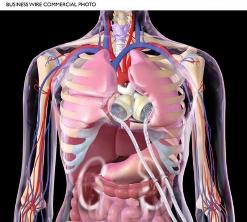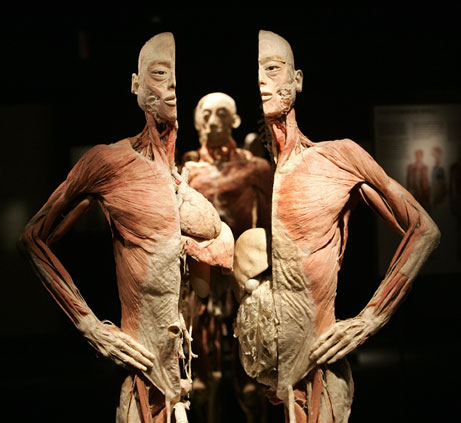IMPACT ON SOCIETYRecently the worlds first working synthetic organ was grown from a patient's own cells at the institute for Regenerative Medicine in Winston-Salem, North Carolina.  Image from daylife.com
INNOVATORS AND THEIR IMPACTS Although with minor successes and financial dilemmas synthetic organs as of now have had an over all positive affect on society, because through continued research on the topic people have created synthetic organs like skin and cartilage, and because of these developments people have been able to make discoveries to increase a persons life span. Through implantable devices people have been able to enhance sight, hearing, and save lives. That of course is just it's impact on society as of today, artificial technology has undergone many trail and errors, and through these it has created many impacts both good and bad on society. Innovators like M. Von Frey and M. Gruber, and their major innovation the first artificial heart-lung apperatus in 1885. When the device was first created it came with many risks, but the device was considered an ideal pump by the scientific community because it pumped blood smoothly, it's design included a method for controlling the flow of blood, and it was also an oxygenator. It's creation changed the worlds outlook on what could be accomplished through science, so progress continued. This was a major stepping stone up the stairs of science, but it was not without it's faults and was not tested right away because of these errors. Extracorporeal membrane oxygenation or ECMD was the name of the technique. It was worked on so heavily that it wasn't released for a while, to insure that it would have the best results. In 1957 De Wall Lille hehei thought of the helix reservoir disposable bubble oxygenator at the University of Minnesota. His creation was a major innovation as it created a disposable way for oxygen to diffuse through the blood plasma to red blood cells. It also created a way of mass producing oxygen safely worldwide. It however needed to first be tested on 250 patients, and it since it became safe and was approved it affected the medical system greatly through it's global distribution. Just like everything it most defiantly created some difficulties as well, this was however excepted but because of it's contributions to open heart surgery these complications were probably over looked. Through these innovations the world was impacted in many different ways.
|
||

FAILED INVENTIONS CREATE SUCCESSES The failed innovations probably had some really big impacts, but not positive ones. People are naturally cautious about surgeries and new devices, so it was only natural that people felt afraid after an attempt to implant a fabricated tubular ventricular assist device failed in 1963, resulting in a man's death. Although it had created a sense of fear it was later donated to the Smithsonian's National Museum of American History by Dr. Hall, because people can learn from their many mistakes. All of these new creations brought with them positive and negative impacts, but for scientists this is what's needed to make progress. Even though it was a failure it resulted in things like the first human cardiac transplant carried out by Christian Barnard of South Africa in 1967, or the first successful human liver transplant was reported by Thomas Starzl of Denver in 1968.
IMPROVEMENTS EMERGE Nuclear powered energy cells were even attempted for implantable cardiac devices in animals in 1968, maybe not the best of ideas but you may begin to see that there was a ripple affect which was created by each scientist. What one scientist does affects the other and the other, and as each person is impacted by the other new ideas begin to form. Better and more improved ideas that will impact society for the better. If one person chooses to become a scientist in the field of synthetic organ transplants or otherwise anything else related to science in general they should expect that every single thing that they touch or create weather its successful or a failure will impact society for the better or the worse, and impact the next generation of innovators to come. Now we live in a world where new ideas are emerging. For example when the idea of creating artificial blood came about people began to get excited. At the time almost every single company that wanted to create synthetic organs was interested in synthetically grown blood, so they'd be able to break the vascular, avascular problem. Another thing that really created a big impact in the world was the creation of the first ever artificial stomach machine, which was created from strong plastics and metals by a Dr. Martin Wickham. A really big one would be the possibility of creating artificial wombs, the gay community likes this idea because they would finally be able to have children, however there have been concerns that it goes to far along the lines of cloning. This in particular has caused some political problems for the development of the artificial womb. Many feminists have argued that the creation of such a thing would shatter the mother-child relationship as well, in the end however it is really unknown how an artificial organ will impact the world, but one thing is for certain and that's when controversies arise governments may be concerned about the development of a specific product and cut it. This is because the biotechnology field is split into three parts the first being science, the second being that it's a business, and the third being government. The thing about this is that in order for a company to prosper it needs all of these things, without one of these a company would go out of buisness . |
 This You Tube video is a quick look at a artificial organ created by SynDaver Labs.
 |
|